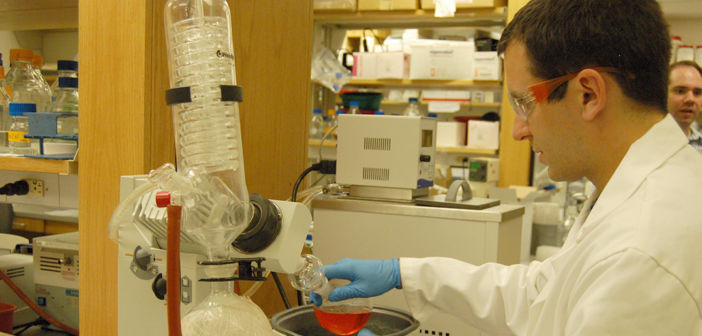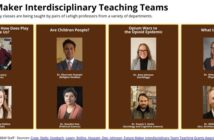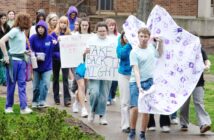In May, a Pennsylvania woman walked into a clinic with a simple urinary tract infection, only to find she was the first U.S. citizen to contract a strain of bacteria resistant to all antibiotics.
The woman had contracted a superbug.
Superbugs are estimated to cause 700,000 deaths around the globe each year, but by the year 2050, superbugs could kill up to 10 million people per year worldwide, according to a report commissioned by the British government in 2014. That amounts to more than those killed by cancer every year. Researchers are looking for new methods to fight these deadly superbugs.
Marco Pires, an assistant chemistry professor at Lehigh, may have found an answer. Pires and his team of student researchers are working on a method that would allow the immune system to trick and attack the resistant bacteria. Similar immunotherapy approaches have been effective in fighting cancer.
“The hope is that we have at least a fraction of the success (researchers are) having on the cancer side,” Pires said.
Julia Nelson, ’18, who has worked in Pires’ lab for two years, explained how superbugs become resistant to antibiotics.
Antibiotics are designed to kill certain strains of bacteria, Nelson said. Though the drugs are typically efficient in killing these bacteria, a few mutated microbes will often survive the effects of the antibiotic. The mutated bacteria will then reproduce and the antibiotic will lose its effectiveness over time.
The overuse of antibiotics is enhancing these drug-resistant bugs.
“We’ve reached a point where there are some bacteria that are just resistant to all known antibiotics,” Nelson said.
With the help of four undergraduate and three graduate students, Pires has devised a method he hopes will stimulate the immune system to kill the superbugs. The bacteria are selectively labeled with an antigen, or a toxin that induces an immune response in the body. The labels allow the immune system to recognize the bacteria with greater ease.
The goal is to awaken the immune system and bring it to the site of the infection, Pires said. A number of new cancer drugs use this immunotherapy approach.
“Unless we come up with an alternative method of killing bacteria, we’ll essentially return to a pre-antibiotic age where something as simple as an infected paper cut could become deadly,” Nelson said.
Last week, the president of the United Nations General Assembly convened a one-day, high-level meeting at the UN headquarters on antibiotic resistance.
The General Assembly has only addressed health issues four times in its history. In the past, the other health issues subject to these high-level meetings were HIV/AIDs, non-communicable diseases and Ebola.
“The golden age of antibiotics is coming to an end,” said Mary Sabulski, ’17G, who is now a graduate student researcher in Pires’ lab. “Bacteria are getting better at avoiding drugs and toxins.”
The General Assembly has described antibiotic resistance as “the greatest and most urgent global risk that requires increased attention and coherence at the international, regional, and national levels,” according to the UN website.
“They’re trying to stay ahead of this, but it’s not easy because today there are still a lot of easy, cheap antibiotics,” Pires said. “It’s not hitting home yet.”
Pires and his student team plan to conduct trials on mice in the near future.
Sabulski and fellow graduate student Jonathan Fura, ’17G, will continue to expand their research on gram-negative and gram-positive bacteria. Gram-negative bacteria, such as E. coli, are often resistant to antibiotics.
Pires said the team is working on tweaking its methods.
“As far as we can see, there’s no reason that (our methods) shouldn’t work, but we’re not going to get an immediate answer,” Pires said.
It will most likely take years before any type of immunotherapy treatment is developed for fighting bacteria, he said. He has been working on antibiotic resistance for three years.
Alexis Apostolos, ’17, an undergraduate student researcher, said Pires is involved in the students’ work. Apostolos participated in research over the summer and continues to work in Pires’ lab this semester.
During the summer months, Pires held weekly lab meetings and hosted a journal club, in which the students presented their findings on current research topics in the field.
Pires also helps students design and run their own experiments.
“It’s always amazing how many new ideas (Pires) has,” Nelson said. “He can always come up with different approaches.”
Sabulski said it’s gratifying to be part of a team that is working on solving a major world problem.
“This is just one way to go about it, and you never do know which method will work,” Pires said. “It’s certainly worked on the cancer side, so we wanted to at least try.”






Comment policy
Comments posted to The Brown and White website are reviewed by a moderator before being approved. Incendiary speech or harassing language, including comments targeted at individuals, may be deemed unacceptable and not published. Spam and other soliciting will also be declined.
The Brown and White also reserves the right to not publish entirely anonymous comments.